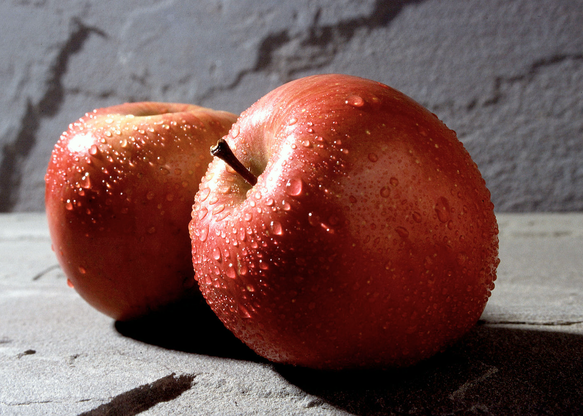BLOG
|
|
THE HUGE MEDIA FANFARE GENERATED FROM A NUTRITION STUDY ON INTERMITTENT FASTING a few days ago overshadowed the July 24, 2019 release of results from an Austrian study which examined the potential gut microbiome benefits of apple core eating in conventionally- versus organically-managed apples. Bacteriologically, it seems eating a whole raw apple, including the core, seeds, and little flowery end (calyx), beats the heck out of eating just the yummy flesh and skin.
Before reading a “Frontiers News Science” blog piece that discusses the research and quotes the study’s senior author, or the much longer original scientific publication in the journal Frontiers in Microbiology, understanding the differences between the two types of apple-growing “management” systems is helpful. According to the publication, harvested organic apples originated from an orchard “which follows the international ‘demeter’ guidelines of organic farming “using sterile gloves and instruments”. Harvested conventional apples originated from a conventional orchard and had been cold-stored, short-term in a controlled atmosphere, and “washed and wrapped in polythene sheets for sale.” During the study all apples were handled in an identical manner. The research showed that highest numbers of bacteria in each type of apple were found in its seeds, the next highest in flesh (pulp), and the least in peel. Conventionally- and organically- managed apple bacterial numbers were roughly equal, about 100 million in a 240-gram apple. The blog article reported that by not eating the core, the bacterial number consumed falls to about 10 million, roughly 9-10 times less. The other highlight covered by the Frontiers News Science blog concerned bacterial strain diversity; it was greater in those handled as organic fruit than fruit processed in the conventional manner. Higher diversity, senior author Professor Gabriele Berg of Graz University of Technology was quoted as saying, is “expected to limit overgrowth of any one species, and previous studies have reported a negative correlation between human pathogen abundance and microbiome diversity of fresh produce.” Study results were supportive of this thinking, which showed that “Escherichia-Shigella – a group of bacteria that includes known human pathogens—was found in most of the conventional apple samples”, although in low abundance. This bacterial group was absent in the organic apples. Conversely, the famously beneficial pro-biotic Lactobacillus microbes were found in organic but not in conventional apples. Important points made by the two sources: To consume the most bacteria, eat a whole raw apple, including core, which contains seeds
Also mentioned in the blog piece was information concerning possible taste differences between organically- and conventionally-managed produce. Certain bacteria known to synthesize compounds which impart a strawberry flavor were found to be “significantly more abundant in organic apples” in the study, “especially on peel and flesh samples.” The findings from this investigation definitely have been placed in my “Good-To -Know” file, which will likely influence future eating and shopping decisions. I thought the only food sources of Lactobacilli were dairy and fermented foods but a bit of digging into the topic indicates some species occur in the environment and on plants and may be responsible for fermentation that occurs in spoilage of fruit juices. [Anyone knowledgeable on the subject, please enlighten us further!] How does this nutrition science relate to athletics and fitness? Apples are a portable carbohydrate/energy source that don’t require special storage. The fruit’s fiber and nutrient content make it Knowing that types of bacteria scientists believe are beneficial to the gut microbiome can be so easily obtained can make a post work-out snack choice easier, especially when packing food is necessary. In the fall, when MacIntosh apples first ripen and come directly from the orchard to store, they are my very favorite fruit. I’ve eaten the whole apple for years to avoid disposing of the core later; plus, I like the crunch of the seeds. The results of this study also mean that it can be worthwhile to seek out organic apples or at least those offered at established roadside stands and farm market vendors. That the organics may indeed be tastier encourages spending extra on this fruit item. RUN & MOVE HAPPY! NOTES:
https://blog.frontiersin.org/2019/07/24/microbiology-apples-bacteria-organic-microbiome/ https://www.frontiersin.org/articles/10.3389/fmicb.2019.01629/ https://www.sciencedaily.com/releases/2019/07/190724090255.htm https://www.sciencedaily.com/releases/2014/03/140310090919.htm https://www.forbes.com/sites/alicegwalton/2019/07/25/the-100-million-bacteria-on-apples-may-be-key-to-their-health-benefits/#44bfb03c1e2f https://www.orangepippin.com/varieties/apples/arlet-swiss-gourmet https://healthyeating.sfgate.com/foods-containing-lactobacillus-bifidobacterium-3728.html https://en.wikipedia.org/wiki/Firmicutes http://www.medibiztv.com/articles/spoilage-of-fruit-juices https://aem.asm.org/content/aem/16/9/1326.full.pdf https://commons.wikimedia.org/wiki/File:Fuji_apple.jpg (not the apple used in the study) Scott Bauer, USDA ARS [Public domain]
2 Comments
2/18/2022 08:32:24 pm
Thank you in return for this appreciative comment. Hope your training and nutrition efforts are showing results!
Reply
Your comment will be posted after it is approved.
Leave a Reply. |
BRIDGE TO PHYSICAL SELF
Running, walking, and fitness activities enable us to experience our physical selves in a world mostly accessed through use of fingers on a mobile device. AuthorEARNED RUNS is edited and authored by me, runner and founder. In 1978 I began participating in 10K road races before 5Ks were common. I've been a dietitian, practiced and taught clinical pathology, and been involved with research that utilized pathology. I am fascinated with understanding the origins of disease as well as health and longevity. Archives
November 2023
CategoriesNew! Search Box
Earned Runs is now searchable! Check it out...
|


 RSS Feed
RSS Feed